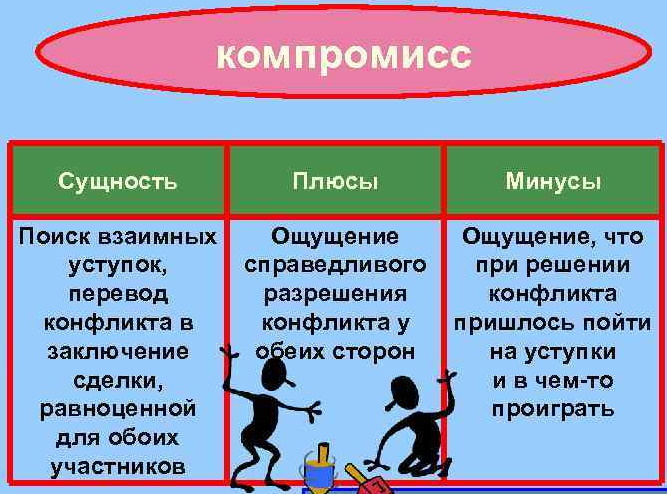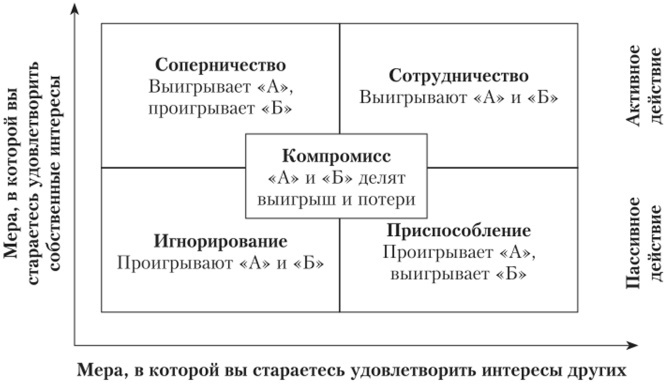Content
- The concept of compromise in psychology
- What is compromise in conflict and decision making?
- Will the skill be useful in life and where?
- Pros and cons
- Views
- Positive compromise
- Negative compromise
- What is an Unfavorable Compromise
- People around
- Complexes
- Majority influence
- How is compromise different from consensus?
- Is a trade-off in leader psychology strength or weakness?
- Compromise as a method of conflict resolution
- Compromise in family relationships
- How to find a compromise?
- What's wrong with compromise?
- When shouldn't you compromise?
- Compromise video
Often people fail to agree and come to a common denominator on a particular issue, which can give rise to the development of misunderstandings, conflicts and disagreements. Such behavior, when two or more people do not hear each other and continue to zealously defend their point of view, is destructive and, according to psychologists, extremely ineffective.
For maintaining friendly, family and working relationships, it is much more effective when the parties do not argue, but strive to come to some kind of compromise - an agreement that will more or less suit all participants spore. In some cases, this action requires the parties to abandon their own ambitions and interests, which can be difficult for some people to do.
The concept of compromise in psychology
"Compromise" is literally translated from Latin as "they promise together." There is always a clash of interests, a conflict behind a compromise.
Psychologists call a compromise such a settlement of a dispute in which the parties manage to come to a certain position that suits each of them, with a mutual rejection of some of the requirements. As a result of the resolution of the disagreements that have arisen in the course of the conflict or dispute, the partners participating in negotiations, change their minds, and each of them adopts a new common position that suits both sides.
The purpose of the compromise is to find a common denominator in the course of the dialogue that would suit the opposing sides. Finding such common ground, or otherwise compromise, is the smartest way to balance conflicting interests. The compromise approach is based on the principle of respect for other opposing opinions, which in a global sense is part of a democratic approach to social governance.
In psychology, finding a compromise is assessed positively, since when making a common decision, the parties succeed agree and not go into insoluble destructive conflicts, where no one hears each other and is not going to give in. The derivation of a solution suitable for everyone does not destroy the relationship, does not emotionally exhaust the parties to the dispute and does not hinder their development.
What is compromise in conflict and decision making?
A compromise in psychology is a decision for which the opposing parties must make meet some steps towards each other and understand what result will be mutually beneficial and will suit each of them.

Finding such a common denominator requires the parties to the conflict to partially or completely abandon ambitions and interests, which can be very difficult to do unilaterally. For this reason, they talk about a compromise only if each of the parties makes concessions and accepts mutually beneficial terms.
Today, most civilized people do not feel the need to resolve issues and defend their position with their fists, showering their opponents with insults and curses. In the modern world, people understand that it is easier, faster and more efficient to negotiate with each other than be at enmity, because with the opposite side you can always discuss all issues and without physical violence.
A calm compromise approach to making decisions and resolving disagreements helps to win both in a petty individual dispute and in more global issues at the state and global level. The practice of imposing, including physical, the will of one side on the other is extremely ineffective, and leads to the emergence of protracted conflicts and stagnations, both in interpersonal everyday relations, and in the framework of the settlement of state and interstate questions.
Will the skill be useful in life and where?
Some people think that making compromise decisions is a manifestation of weakness, but this is fundamentally wrong. Compromises are necessary and very useful and demonstrate not the weakness of opponents, but the ability to listen and hear each other. In this case, the concept of mutual concessions for the sake of settling a conflict situation demonstrates greater efficiency than stubborn upholding of a position and unwillingness to sacrifice ambitions and convictions.
The ability to come to a common decision is useful for an individual everywhere - in work, family, household and social life, since will help him build harmonious relationships with the environment and not waste his energy resources on scandals and squabbles.
Pros and cons
A compromise in psychology is an agreement between people or a group of people, to which they come through mutual concessions.
The benefit in choosing compromises in resolving disputes is obvious, since such a settlement of issues allows:
- keep the relationship;
- avoid mutual insults, reproaches, the use of brute physical force;
- get a unique experience in negotiation;
- often completely resolve the dispute that has arisen;
- find a solution that is attractive to all parties.
Despite the advantages of a peaceful compromise settlement of differences, this approach still has some drawbacks.
These include:
- incomplete satisfaction with the result obtained;
- often the conflict can escalate again;
- the parties have to compromise their ambitions and principles, possibly pride;
- not all people know how to negotiate and make informed decisions.
Views
Compromise is the ability of the opposing sides to meet each other halfway and find a suitable solution somewhere in the middle.
In psychology, there are 2 types of compromise:
- positive - it is also called voluntary;
- negative - or otherwise forced.
Positive compromise
A voluntary or positive compromise is made by the parties without the intervention of third parties. As an example, we can cite a situation when 2 people who have not seen each other for a long time want to meet and, agreeing on a certain date, find out that at this time, one of the parties has planned a trip to the concert, tickets for which were purchased in advance, and the other party cannot come to the meeting in the other day.
In this case, the parties can, after discussing the situation, agree to meet at the concert itself, after it, or even postpone the meeting altogether. for a better time, while no one will put pressure on each other and the opponents will jointly make a decision that is most satisfying them.
Negative compromise
A negative compromise is viewed as a forced one, since in this case one of the parties presses on the other when making a decision. In this case, the agreement rather becomes like an ultimatum, since usually one opponent tries to influence the other dishonestly, pressing on pity, vulnerable parties, fears.
An example is the situation when a husband forces an overweight wife to lose weight, threatening to leave her and get a divorce. If, in this situation, a frightened woman follows the lead and begins to exhaust herself with diets, pills and unbearable physical loads, then such a compromise negatively affects her health and is unlikely to help maintain truly harmonious family relationship.
What is an Unfavorable Compromise
Compromise in psychology is a way of cultural settlement of problems between different representatives of society. Often, a compromise will develop into a relationship resembling an ultimatum, when one of the parties completely suppresses the will of the other. However, in this case, a compromise cannot be mutually beneficial, since its achievement does not imply a simultaneous rejection of the own interests of each of the opposing sides.
In real life, there are many factors that force a person to make an unequal compromise and act contrary to their desires and life principles.
People around
Most often, it is difficult to reach a compromise with close people around them, who, having information about a person's life, know how and with what to put pressure on him in order to achieve what he wants. This kind of compromise is often found in couples, where one of the partners is a despot, narcissist or abuser and is good at manipulating his other half.
Also, with unfavorable compromises, it is possible for people to use their higher position, both in family and social life, which is often observed in conflicts between fathers and children, subordinates and superiors, when a party occupying a higher position or being at an older age puts pressure on the opponent with its authority.
For example, a young person leaving school wants to study to be a teacher, but his family does not like his choice, and they are trying in every possible way to influence him, saying that they have more experience, and they know better where more is possible make money.
As a result, they suppress the will of the young man with their authority, and he goes to do where his more experienced relatives want. In this situation, the interests of the youngest person who does not like future profession, but he is forced to make concessions, since he depends on his parents and does not want them upset.
Complexes
The presence of complexes in a person leads to the development of excessive sacrifice and sharply increases his chances of finding himself in situations that are unfavorable for him when resolving disputes and conflicts. Lack of parental love in childhood (especially maternal), lack of care and warmth, as well as difficulty in adolescence, lead to the fact that a person may develop various complexes, self-doubt and guilt.
Such individuals are often unable to defend their interests, as they feel they are not needed by anyone and do not deserve happiness. When they find themselves in a conflict situation, it is easier for them to accept all unfavorable conditions than to remain guilty and, as it seems to them, all abandoned.
Majority influence
Under pressure from the collective, people often have to make concessions that are disadvantageous to them because of the fear of being rejected and becoming what is called a “black sheep”. The situation can often be aggravated by the presence of complexes in the individual and in this situation he will never go against opinion of the majority, even if he does not like it and makes him neglect his own high moral principles.
For example, in organizations, a situation often arises when the rest of the team speaks arrogantly with a new employee and in every possible way tries to show him where he belongs. Such "introductory" tactics may not be to everyone's liking, but for fear of being in the same place with this new the employee will not say about this and will not demonstrate his possible sympathy for the newcomer in any way, but will imitate the majority.
How is compromise different from consensus?
Compromise is often confused with consensus, but the two are somewhat different. Translated from Latin, consensus means "unanimity" and denotes such a way of resolving conflict situations and disputes in which the parties do not have fundamental objections to key questions.
A typical example of consensus is a situation where a family chooses where to go on vacation, at sea, in the mountains or on a sightseeing trip. tour, but at the same time, no one insists on any of the positions in principle, and after a joint discussion, everyone agrees to go to sea.
If one family member (or several) definitely wants to go on an excursion, and the other (others) to the sea, then the parties can reach a compromise by agreeing to combine both events.
Thus, they speak of consensus when a decision is made as a result of unanimous consent and the parties do not have fundamentally different views on a particular issue. If the opponents made a number of mutually beneficial concessions, then we are talking about the conclusion of a compromise.
Is a trade-off in leader psychology strength or weakness?
Many believe that concessions and indulgences in resolving conflict situations indicate a manifestation weaknesses and a strong person, a leader, will never take such steps when resolving disputes and conflicts. However, this opinion is erroneous, since a gross demonstration of strength and unwillingness to negotiate indicates not strength, but the stupidity and inflexibility of a person or some social group.
Making uncompromising decisions is characteristic of non-democratic management styles - authoritarianism, totalitarianism, for which it is generally not typical to consider another position as having the right to Existence.
However, if you look at the dynamics of development of democratic countries in Europe and authoritarian regimes (North Korea, some former USSR countries), you can clearly see some of them have gone further in their development, and some, suppressing dissent and not wanting to seek compromises with society and the opposition, have been in stagnation for many years.
The same analogy can be drawn at the household level. If a tyrant man does not take into account the needs of the interests of his wife and children, but at the same time defends and imposes his opinion on all vital issues, then this ultimately leads to the collapse of the family and does not indicate the strength of the individual, but the propensity to despotism.
On the other hand, the ability to make compromise decisions does not at all mean that a person should follow the opponent's lead in everything and agree with everything. The task of a strong and confident leader in resolving issues and resolving conflicts is to convince the opponent of his righteousness and gaining authority, thanks to which the opposing side will listen to the arguments. It is also equally important for a leader to be able to hear other people's arguments and reckon with them.
Compromise as a method of conflict resolution
Psychologists argue that any conflicts should not remain unresolved, since such incompleteness negatively affects interpersonal relationships. They call a compromise one of the most effective ways to resolve them. With this conflict resolution strategy, the parties make mutual concessions, while none of them remains in win, but there are also no losers, since each of the opponents had to sacrifice something in order to come to a common agreement.
This method of resolving conflict situations allows you to maintain existing relationships and resolve differences that have arisen. When starting negotiations and trying to reach a compromise, the parties, as a rule, do it voluntarily and do not accept the opposite side as an opponent or opponent, which contributes to finding the most acceptable for each sides of the decision.
Compromise in family relationships
In family life, the emergence of conflict situations is inevitable. People who really care about maintaining a relationship should learn how to properly arrange priorities and make concessions to each other, because the ability to find a compromise is the basis of a happy marriage.
Often, one of the partners can act selfishly and force the other half to sacrifice their own interests for their own benefit. In this case, the victim will still accumulate resentment, which sooner or later will find its expression.
In marriage, in everyday family life, situations regularly arise when the points of view of the wife and husband do not coincide. This may include raising children, spending money, choosing a vacation spot or buying new furniture in the home.
If each partner behaves self-centered and demonstrates rejection of the opinions of the other, then such a marriage is unlikely to be strong and can last long. We can say that compromise is the basis of family life, otherwise the life of one is under the other will not be happy and he is unlikely to want to see himself for a long time in such unequal relationship.
How to find a compromise?
A compromise in psychology is an effective agreement between the opposing parties, which is reached by them on a voluntary basis as a result of concessions from each of them.
In order to find a compromise, you must:
- enter into an open dialogue with the opposing side;
- listen carefully to your opponent;
- each of the parties to behave respectfully and calmly (sarcasm, shouts, curses are unacceptable);
- put yourself in the shoes of a partner, advise him to do the same;
- express and defend their point of view in acceptable ways;
- be honest and open.
The result of such negotiations should be the finding of a common solution that would be more suitable for all parties to the conflict.
What's wrong with compromise?
Opponents of compromise believe that this decision does not lead to the settlement of disputes and the result "neither you nor me" is something average and, in fact, does not satisfy either side. They believe that compromise is a special case of a “lose-lose” situation in which neither side ends up getting what it wants. In this situation, the conflict itself is resolved or extinguished, but the parties do not feel joy from the agreements reached.
It also often happens that the agreements reached are not equivalent due to the fact that one of the parties makes concessions to a greater extent, and the other to a lesser extent. The result is a veiled version of the win-lose trade-off, which is not an honest and fair decision in relation to one of the opponents.
At the same time, it is practically impossible to find a compromise option in which both sides would remain in an advantageous position without the need to make concessions. That is why a compromise, in which opponents sacrifice something for the sake of maintaining peace and achieving common goals, is still a more acceptable option for resolving disputes.
When shouldn't you compromise?
There are many situations where you shouldn't make concessions and compromise:
| If: | Explanation | Example |
| You must sacrifice your moral principles | You should not go against your own ethical and moral principles | You cannot forgive a husband's betrayal, even if he swears in love and tries to bribe with gifts and money. |
| There is manipulation | When selfish intentions are hidden behind good deeds | A person should not trust colleagues at work, who obsessively offer something tasty and try in every possible way to gain trust in order to shift some of the responsibilities onto him. |
| The person is used unilaterally | You shouldn't be allowed to take advantage of your kindness and compassion. | A friend leaves her baby when she needs to leave, but refuses to do the same when the other party needs it. |
| Something intuitively warns against error | When your gut tells you that you shouldn't compromise, it's better to listen to it. | You should not hire unreliable relatives under your own responsibility if there is a feeling that they can let you down, even if the relatives ask for them very much and promise to thank them. |
Compromise is a civilized way of settling disagreements that arise at different levels - family, work, and state. In psychology, this method of resolving problem situations is considered the most effective and acceptable, since it leads the opposing sides do not lead to enmity and open confrontation, but helps to smooth out sharp corners and avoid development destructive conflict.
By making concessions to each other, the parties, even if they have to sacrifice something, in any case receive more than if they begin to feud in the intention to suppress the will of the opponent and achieve their full least.
Compromise video
Compromise is good or bad:



